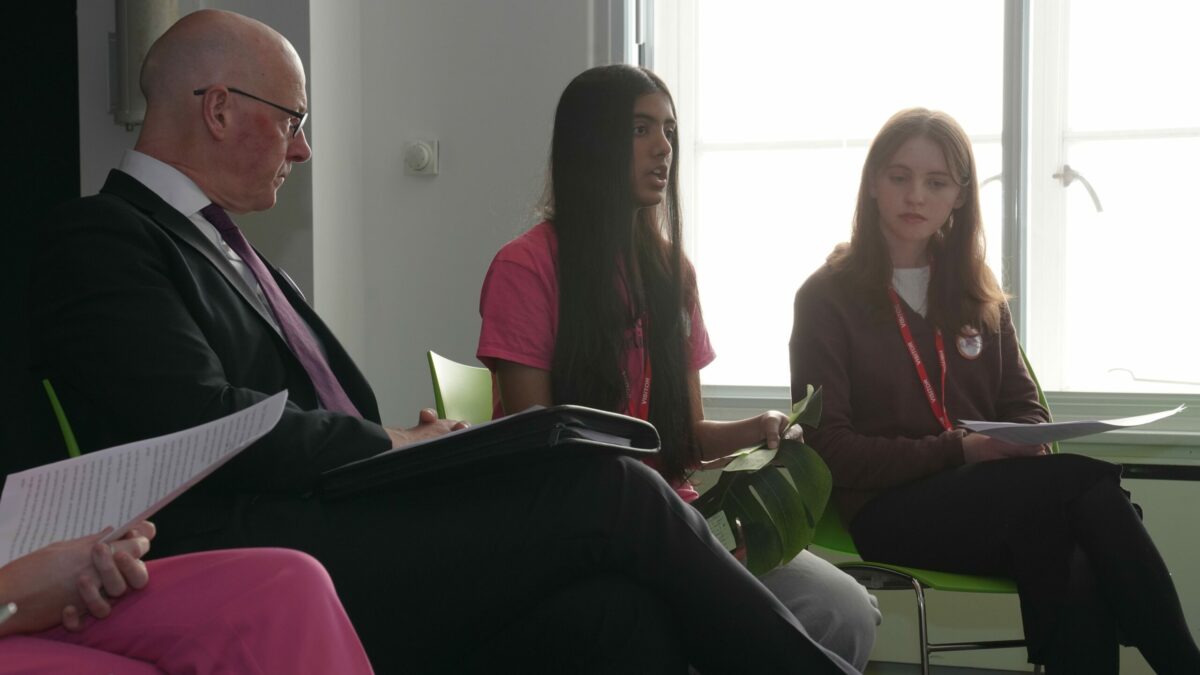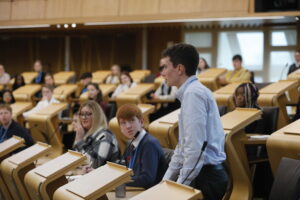In November 2024, Martha Dickie MSYP and Esperanza Giesen MSYP gave a speech to the First Minister and their Cabinet on ending gender-based violence at the Annual Cabinet Meeting with Children and Young People.
Reflecting on the events of the day, Esperanza said:
Ending gender violence and inequality is a topic at the centre of my interests as a Member of the Scottish Youth Parliament, and this opportunity allowed me to speak directly to the biggest decision makers in Scotland about the root causes of the issue, how it affects young people, as well as some of the different ways it can be solved.
It was truly an empowering experience as a young leader, but also as a minority to directly communicate the ways in which the government can help and protect young people.
After my speech, I’m really looking forward to the next steps the government takes to tackle and end gender-based violence.
You can read our speech below:
We first want to stress that gender-based violence “refers to any type of violence directed at an individual based on their gender identity, and is rooted in gender inequality, the abuse of power and harmful norms”. This means that while this issue overwhelmingly effects women and girls, anyone can be a victim to violence.
As a young woman, it feels like second nature to constantly check your surroundings when walking alone at night. It feels like second nature to keep your keys between your fingers, or to stay on a phone call with a loved one, or even to take four left turns when driving. These are only some examples of the efforts we go through just to make it home safely. Being able to live in a safe world should not feel so out of reach. We are here today to talk about our ambitions for a Scotland free from gender-based violence and highlight the voices of young people throughout this entire process.
Within SYP, our gender-based violence campaigning group is fighting for a system that would see decision makers, the Scottish Parliament, youth groups, employers and schools all working together to end gender-based violence. We also want this system to reflect the views and experiences of members from different communities across Scotland. But this work shouldn’t be one-sided. The young people of Scotland are calling on you to solve this crisis and to finally make Scotland a better place to live – for everyone.
Intersectional marginalisation means some groups experience heightened discrimination due to the several identities they respond to such as race, gender and sexual orientation. This creates a major barrier to support, leaving people trapped in abusive relationships for longer, feeling frustrated by community inaction, and betrayed by law enforcement—yet the oppression persists. Such characteristics are repeatedly excluded from decision-making bodies, resulting in this crisis being ignored. These minority groups are statistically more likely to be victims of gender-based violence yet are repeatedly left unrepresented and unprotected. Zero Tolerance has identified that disabled women in the UK are twice as likely to experience men’s violence than non-disabled women.
Gender-based violence is deeply woven into the fabric of society and history, so much so that it has been normalised over generations. It manifests in subtle behaviors, systemic inequalities, and outright acts of harm, often dismissed as “just the way things are.” This tolerance allows it to thrive and hurt the most marginalised groups. According to the Violence Against Women and Girls Report, “black women were the largest single ethnic group to have experienced domestic abuse. So, every ignored comment, overlooked act, or excuse made for abusive behavior reinforces a culture where such violence is permitted to continue unchecked. This must change. Silence is complicity; but action is the only path forward.
Young people deserve to grow up in a welcoming, inclusive and accepting society. As Scotland’s top decision-makers, you can, and must, make this a reality. To ultimately tackle gender-based violence, the following must take place:
- Introduce and improve legislation to end gender-based violence.
- Incorporate a gender mainstreaming approach in all policy processes.
- Improve education and understanding of microaggressions to create healthier and safer working and school environments. This will help tackle gender-based violence at its root and develop a more consistent approach from the start through open dialogue.
The Hate Crime and Public Order Act has been critical for demonstrating the Scottish Government’s commitment to protecting vulnerable and marginalised communities across Scotland. Nonetheless, we are here today to ask that you also consider how you can better protect those most at risk of gender-based violence.
This can be achieved through creating specific legislation that makes misogyny and misogynistic behaviours a hate crime in Scotland. Such legislation must also take an intersectional approach that recognises that women and girls experience gender-based violence differently depending on what intersecting identities they have.
You can also, and this is inspired by another MSYP in the room who put forward the Motion at our recent Sitting, recognise and protect against femicide in Scots Law.
Through specific legislation, young people, decision-makers and other stakeholders can work to not only bring justice to those who experience gender-based violence but can also use the legislation as a framework for gathering data, tackling the root causes and ending the epidemic of violence from the very start.
By taking a gender mainstreaming approach to all policy processes, the Scottish Government will more actively consider the different needs, circumstances and experiences of women and men (trans inclusive) in all stages of policy planning, monitoring and evaluation. It means putting gender at the heart of all our policy decisions. This is done through gendered analysis (and not just in the departments where it seems relevant, but across all areas of government), gender impact assessments and training all policy makers to be gender competent.
As has been discussed, gender-based violence affects everybody. Therefore, it is massively important that both men and boys are included in the conversation, as well as being educated on the issue, to ensure everyone is able to access the correct tools in order to end gender-based violence.
As part of this, SYP truly believes that it is massively important to tackle microaggressions. This is because they are the foundations for misogyny and violence in society as they normalise demeaning and derogatory behaviour and attitudes towards women, and it is essential to educate against this and the dangers of misogyny in society before they even begin. For this to be effective, it must also take place in collaboration with young people. Our participation is essential in fighting against gender-based violence.
Even by standing where we are today is an achievement. These meetings of cooperation, when those in power take a seat to listen to young people, are the only thing like it in the entire world! This means you now have the unique opportunity to amplify our voices and act on what we know is needed to eradicate gender-based violence.



